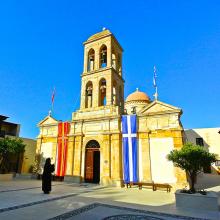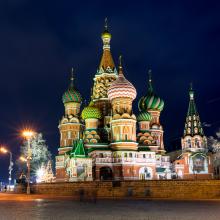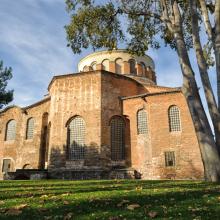Ecumenism
Even by this pope’s standards it was a bold move.
Francis, the spiritual leader of more than a billion Roman Catholics across the globe, this week traveled to Sweden, one of the most secularized countries in Europe, to take part in events marking 500 years since Martin Luther kickstarted the Protestant Reformation.

Image via Tom Heneghan / RNS
The Russian Orthodox Church, whose boycott of a major summit of Orthodox Christian leaders in Crete last month threatened to slow down efforts to promote greater unity, has declared the meeting “an important event in the history of the conciliar process.”
The church’s synod, in its official reaction to the June 20-26 Holy and Great Council, also said the meeting could not be called “pan-Orthodox” because four of the 14 independent Orthodox member churches did not attend.

St. Basil's Cathedral in Moscow. Image via Elena11 / Shutterstock.com
After a gap of over 1,200 years, including 55 years of preparation, the planned Holy and Great Council of the Eastern Orthodox churches has turned into a cliffhanger only days before it is set to open.
The historic summit of the 14 Orthodox member churches was called by their spiritual head, Ecumenical Patriarch Bartholomew of Constantinople, to promote unity among the faithful who had grown apart by geography, language, and customs.

Hagia Irene church. Image via Salparadis / Shutterstock.com
A religious summit last held more than 1,200 years ago suddenly risks being downgraded or postponed because of Syria’s four-year civil war. This unexpected twist has come as the world’s Orthodox churches, the second-largest ecclesial family in Christianity, were supposed to be only months away from their first major council since 787.
Now it is no longer clear when or where the Holy and Great Council of the Orthodox Church, a summit first proposed at least as far back as 1961 and provisionally scheduled for May in Istanbul, will be held.
With its traditional icons and complex liturgies, Orthodox Christianity can seem like an unchanging remnant of a long-lost era. But it lives very much in today’s world and its 14 autocephalous (independent) member churches can be wrapped up in its politics and subject to its pressures.

Image via Claudia Daut / REUTERS / RNS
Pope Francis has a knack for setting traditionalist teeth on edge with unscripted musings on sacred topics. He recently did it again when he seemed to suggest that a Lutheran could receive Communion in the Catholic Church after consulting her conscience.
The exchange came up during a prayer service Nov. 15 at a Lutheran church in Rome that had invited the pontiff. And he used the occasion to engage in a question-and-answer session with some of the congregants.
One woman, Anke de Bernardinis, told Francis that she was married to a Catholic and that she and her husband share many “joys and sorrows” in life, but not Communion at church.
“What can we do on this point to finally attain Communion?” she asked.

Image via United Church of Canada / RNS
Two of North America’s most liberal Protestant church groups have teamed up and agreed to recognize each other’s members, ministers, and sacraments.
The United Church of Christ and the United Church of Canada will celebrate their full communion agreement on Oct. 17 at a church in Niagara Falls. Leaders from the two denominations will sign the agreement during the service.
Full communion means the two denominations will recognize each other’s members, ordained ministers, and sacraments.
From the Pacific islands, Rev. Male’ma Puloka shared how only 0.03 percent of the world’s greenhouse gases are produced by the islands in her region, but they are they ones directly experiencing the devastating effects of climate change. What more can be done by the churches to combat global warming and defend the integrity of God’s creation?
We also began looking at global economic inequality. The facts are these: the top 20 percent of the world’s people control 83 percent of the world’s wealth. The next 20 percent control 11 percent of global wealth. That leaves the bottom 60 percent of the world’s population with only 6 percent of the world’s economic wealth. What can the churches do in the face of such severe global injustice?
Beneath this some voiced the cry for hope. Facing such stark challenges of injustice requires a foundation of spirituality and prayer that can inspire our Christian witness.
AFTER SEVEN YEARS of theological, historical, and pastoral conversation, leaders of Reformed and Catholic churches in the U.S. this January signed a carefully worded, one-page agreement to mutually recognize the sacrament of baptism as it is practiced in each other's churches. This agreement represents dedicated—and inspiring—ecumenical work.
The agreement was signed by representatives of the Christian Reformed Church in North America, the Presbyterian Church (USA), the Reformed Church in America, the Roman Catholic Church, and the United Church of Christ. This agreement is not unprecedented, coming as it does nearly five decades since Vatican II's decree on ecumenism, in which the Catholic Church recognized non-Catholic baptism whenever "duly administered as Our Lord instituted it, and ... received with the right dispositions." However, for each tradition, baptism gives sacramental expression to that tradition's understanding of the church and what it means to be a member. For these churches to recognize each other's baptismal rites gives visible witness to their mutual desire for unity among the members of Christ's body.
This desire for unity between the churches is not an add-on to the gospel; it is not something we do if we happen to get to it. It is central to the saving work and mission of Jesus.
This January's agreement is spare in its requirements. It states that the use of water and a reference to the Trinity (Father, Son, and Holy Spirit) are all that are needed for mutual recognition. By specifying these two simple elements, the ecumenical team made a decision to respect the liturgical tradition of each church. The unique way that components of the rite have developed in each church—how catechesis is done, the use of scripture, the use of sponsors, anointing, and other elements—do not need to be changed.
Thousands gathered in the Dallas Market Center in November for three days of preaching, Bible study, and action for social justice.
The journey of Christian Churches Together in the USA began in September 2001 when church leaders representing the wider spectrum of the Christian community articulated a vision for a place of fe
The vision of the Global Christian Forum is simple but bold: Can the four main “families” of the Christian community—Orthodox, historic Protestant, evangelical/pentecostal, and
While much recent media hype has focused on the Catholic Church's pedophilia scandal, relatively little attention has been given to the high rate of sexual misconduct in the rest of American Christendom. This truly is a crisis that crosses all borders.
For example, research by Richard Blackmon at Fuller Theological Seminary shows that 12 percent of the 300 Protestant clergy surveyed admitted to sexual intercourse with a parishioner; 38 percent acknowledged other inappropriate sexualized contact. In a 1990 study by the United Methodist Church, 41.8 percent of clergy women reported unwanted sexual behavior by a colleague or pastor; 17 percent of laywomen said that their own pastors had sexually harassed them.
Obviously, this is not just a Catholic problem. And solutions must be broader and deeper than those carried out by Catholic cardinals. The whole church has a responsibility to offer decisive leadership in the area of sexual misconduct—whether it is child abuse, sexual exploitation, or sexual harassment.
Recently, churches have shown unprecedented unity on issues of poverty and welfare reform. Now it is necessary to call for a broad-based ecumenical council addressing the issue of sexual misconduct in the church. Its goal would be transparency and openness in developing stringent, forward-looking guidelines, consistent with denominational distinctions, for preventing and addressing sexual misconduct within Christian churches and church-related institutions. Such a council could include not only denominational representatives but also a majority presence from external organizations such as child protection agencies, law enforcement, psychiatric services, victims' agencies, and legal and legislative representatives.
A half-century from now, will the churches finally learn to get along? We look into our crystal ball to see…
A few years back, after the Berlin Wall had fallen, George Bush was talking about a new world order.






